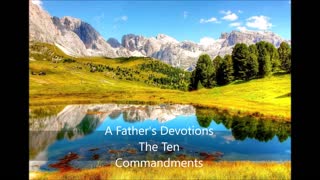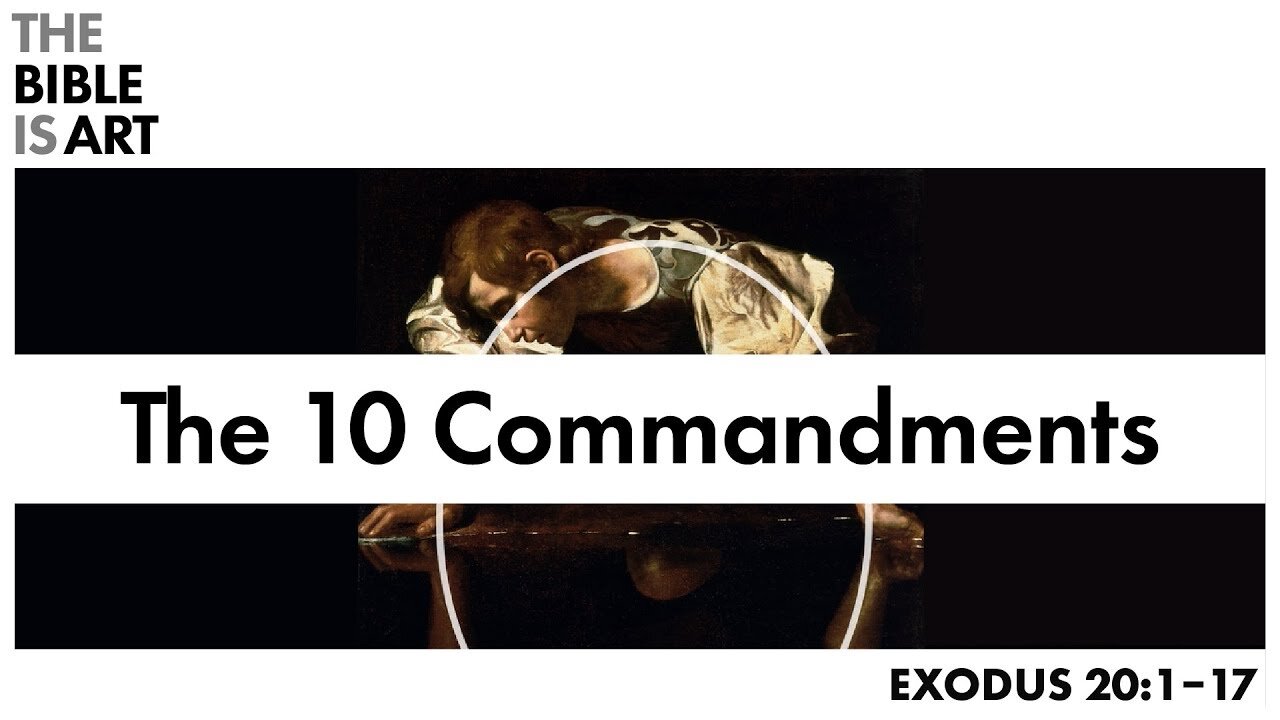The Ten Commandments
In this video I respond to Alain de Botton's School of Life video entitled "How to Replace the 10 Commandments" (https://www.youtube.com/watch?v=XwVJJYfEV1g). In the process we'll look at what makes the 10 commandments literarily and morally sophisticated.
The Bible is the greatest work of literary genius. And The Bible is Art is a YouTube Channel devoted to explaining this literary art in all its sophistication, elegance, and design.
Patreon: https://www.patreon.com/thebibleisart
website: https://www.thebibleisart.com
email: thisdivineart@gmail.com
twitter: @johnbhiggins
music: Kai Engel, "Coelum" (https://www.kai-engel.com)
| How to Learn to Read the Bible as Literary Art |
Reading Biblical Narrative: An Introductory Guide (https://amzn.to/30LzaRa)
Narrative Art in the Bible (https://amzn.to/30RVGIb)
The Art of Biblical Narrative (https://amzn.to/3aDrIfk)
Old Testament Narrative: A Guide to Interpretation (https://amzn.to/38rcE2C)
The Poetics of Biblical Narrative (https://amzn.to/2Gh4cqE)
| Literary Structure |
Literary Structure of the Old Testament (https://amzn.to/30Jdm8X)
Style And Structure In Biblical Hebrew Narrative (https://amzn.to/2RDTTlQ)
| Genesis |
Creation: The Story of Beginnings - Grossman (https://amzn.to/2GlPwq9)
Abram to Abraham: A Literary Analysis of the Abraham Narrative - Grossman (https://amzn.to/2v7id7Z)
Narrative Art in Genesis - Fokkelman (https://amzn.to/2ulmd4t)
A Commentary on the Book of Genesis (Part I) - Cassuto (https://amzn.to/2NOAhdt)
A Commentary on the Book of Genesis (Part II) - Cassuto (https://amzn.to/2Gcuk6d)
Genesis: A Commentary - Waltke (https://amzn.to/2vaBvt7)
The Gospel of Genesis: Studies in Protology and Eschatology - Gage (https://amzn.to/2RGjRFo)
Abraham and All the Families of the Earth: A Commentary on the Book of Genesis 12-50 - Janzen (https://amzn.to/2TVyCqJ)
Genesis 1-15, Volume 1 - Wenham (https://amzn.to/2TQnYRO)
Genesis 16-50, Volume 2 - Wenham (https://amzn.to/3aDY21J)
| Transcription |
Some time ago the philosopher Alain de Botton’s School of Life released a video called “How to Replace the 10 Commandments.” He said that they “maintain an extraordinary hold on our imaginations” but the problem is that they sound “peculiar” today. They were for a particular people and thus they are a bit parochial.
In their stead he offers his own ten commandments. And before you watch this video you should watch his that I’ve linked in the description. Even though many of his commandments relish Alain’s gentle and careful character, they should not replace the ten commandments in the Bible. And that is because they’re inferior. G.K. Chesterton said that before you tear a fence down, you probably should figure out why it was put there in the first place. So let’s look at the art of the ten commandments and the 10 reasons they are superior:
Length - The Biblical Ten Commandments are 172 words compared to Alain’s which have 614. Alain’s are much much longer. Well, why does that matter. Perhaps the ten commandments have such an extraordinary hold on our imagination because of their pithiness. It's difficult to hold something in our imagination if it won't fit. This summary of the moral law was composed not simply to provide moral knowledge but provide it pedagogically. Not just as a list of good things to do but it was designed for consumption and memorization.
Moral reasons - Alain’s ten commandments do not give us any reason why we should follow his commandments. The Bible’s ten commandments by contrast begin with “I am the Lord your God who brought you out of the land of Egypt out of the house of slavery.” The reason why they ought to follow these is because God freed them from slavery. It is quite a more anemic motivation to listen to Alain “simply because he said so.” A moral life requires both reasons for obligation as well as robust motivation - a requirement certainly met with manumission from slavery, as in the biblical ten commandments. And when we are faced with grave temptation to evil, cheating on a spouse, extorting money at work, simply having a list of guidelines without any strong account of obligation won’t do any good. A list, even a profound and elegant one may be wonderful, but that doesn't provide a binding or exciting obligation.
Moral epistemology - perhaps the strangest part of Alain commandments is that we are never told how we know them. It is as if someone strolls into you office and tells you a list of instructions without sharing with you who they are or on what authority they offer the commands. The Ten Commandments begin with “I am the Lord your God” that is how we know these commandments, by God telling us. Therefore we can expect that deeper insight or clarification on moral knowledge will come from the same source. Should or ought we go to Alain for further insight? Did he get them from somewhere? We’re simply left to wonder.
-
 15:46
15:46
PastorCraigBailey
3 years ago $0.02 earnedThe Ten Commandments Part Three
75 -
 25:30
25:30
Lutheran Church of The Incarnate Word
3 years agoTen Commandments Sermon-Awesome!
311 -
 3:18
3:18
A Father's Devotions
3 years agoA Father's Devotions The Ten Commandments
22 -
 1:37:05
1:37:05
AlaskanBallistics
8 hours ago $1.98 earnedI Love This Gun PodCast #16
32.8K3 -
 2:59:26
2:59:26
Twins Pod
17 hours agoEMERGENCY PODCAST WITH ANDREW TATE! - Twins Pod - Special Episode - Andrew Tate
175K177 -
 2:52:01
2:52:01
Jewels Jones Live ®
2 days agoTRUMP SECURES BORDER | A Political Rendezvous - Ep. 113
91K36 -
 25:02
25:02
marcushouse
1 day ago $45.91 earnedStarship Just Exploded 💥 What Went Wrong This Time?!
182K84 -
 12:00
12:00
Silver Dragons
1 day agoBullion Dealer Reveals Best Silver to Buy With $1,000
115K11 -
 12:58
12:58
NinjaGamblers
20 hours ago $15.91 earnedIs This The BEST Way to Win At Roulette? 😲
152K13 -
 1:01:54
1:01:54
CharLee Simons Presents Do Not Talk
3 days agoCALIFORNIA'S DONE!
103K43
